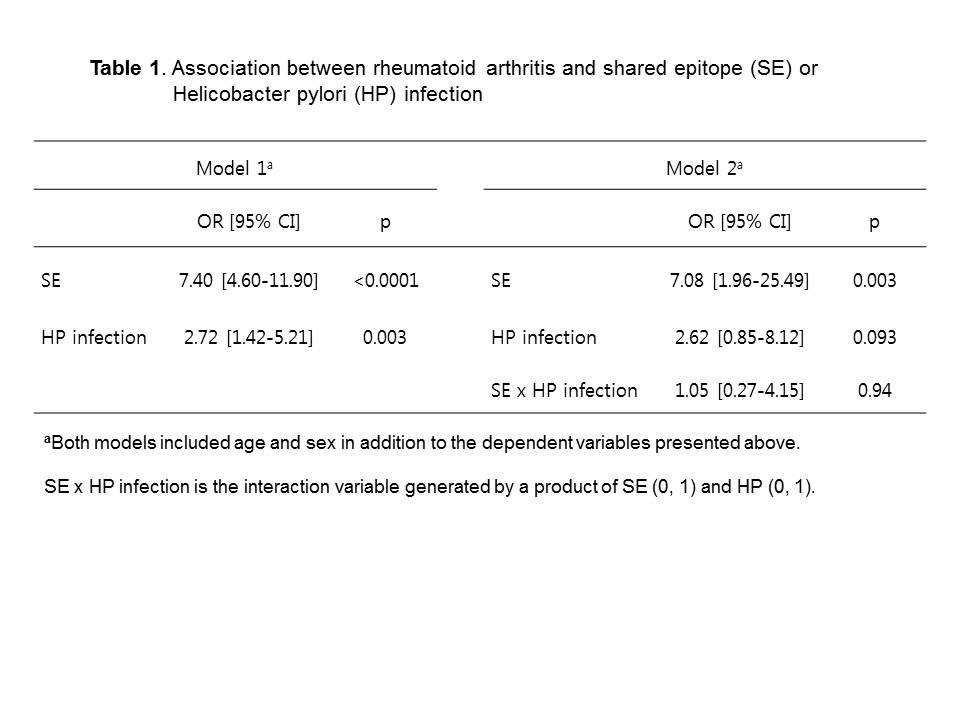Session Information
Session Type: Poster Session (Tuesday)
Session Time: 9:00AM-11:00AM
Background/Purpose: While smoking is an important environmental risk factor for rheumatoid arthritis (RA) development, only a small proportion of Korean patients with RA were found to have tobacco exposure. Since Helicobacter pylori (HP) infection is not only highly prevalent among Korean adult population but also causes chronic gastric inflammation, we aimed to test potential interaction between shared epitope (SE) and HP infection for the risk of anti-citrullinated protein antibody (ACPA)-positive RA in a Korean population.
Methods: SE distribution and HP infection status were compared between ACPA-positive patients (n=202 for cases) who met 1987 ACR classification criteria for RA and age- and sex-matched healthy controls (n=187 for controls). SE was considered positive for HLA-DRB1*01:01, *01:02, *04:01, *04:04, *04:05, *04:08, *04:10, *10:01, *14:02, and *14:06. HP infection was assessed by ELISA based anti-HP IgG titers (cut-off value of 20 U/mL). Logistic regression analysis was used to estimate the odds ratio (OR) and 95% confidence interval (CI). The relative excess risk due to interaction (RERI) based on OR was estimated to assess additive interaction.
Results: Patients with RA showed a mean (standard deviation, SD) age of 41 (11.7) years with 63.3% female. The anti-HP IgG titer was significantly higher among RA patients than controls (mean±SD, 6832±6406 vs. 3539±5238, p < 0.0001). RA patients showed a higher prevalence of HP infection and SE than controls (90.1% vs. 75.9%, p < 0.0001 for HP infection; 75.2% vs. 35.1%, p < 0.0001 for SE). SE and HP infection were independently associated with RA, adjusting for age and sex (Table 1, Model 1). The magnitude of association between HP infection and RA was similar between SE carriers (2.63 [1.17-5.88]) and non-carriers (2.72 [0.90-8.47], adjusting for age and sex. We found no multiplicative interaction between HP infection and SE for the risk of RA (measure of interaction [95% CI] = 1.05 [0.27-4.15, p = 0.94) (Table 1, Model 2). Although the additive interaction was positive (RERIOR [95% CI] = 9.87 [-3.73-23.48], p = 0.15), it was not statistically significant possibly due to limited power.
Conclusion: There was a significant association between RA and HP infection independent of SE status. We found no multiplicative interaction but positive, albeit statistically not significant, additive interaction between HP infection and SE for the risk of RA. Whether the association derives from causal relationship or merely suggests a higher susceptibility towards HP infection among RA patients remains to be determined.
To cite this abstract in AMA style:
Kang E, Bang S, Lee Y, Ha Y, Lee Y, Song Y, Bae S, Lee E. Helicobacter Pylori Infection Among Korean Patients with Rheumatoid Arthritis and Its Interaction with Shared Epitope [abstract]. Arthritis Rheumatol. 2019; 71 (suppl 10). https://acrabstracts.org/abstract/helicobacter-pylori-infection-among-korean-patients-with-rheumatoid-arthritis-and-its-interaction-with-shared-epitope/. Accessed .« Back to 2019 ACR/ARP Annual Meeting
ACR Meeting Abstracts - https://acrabstracts.org/abstract/helicobacter-pylori-infection-among-korean-patients-with-rheumatoid-arthritis-and-its-interaction-with-shared-epitope/

